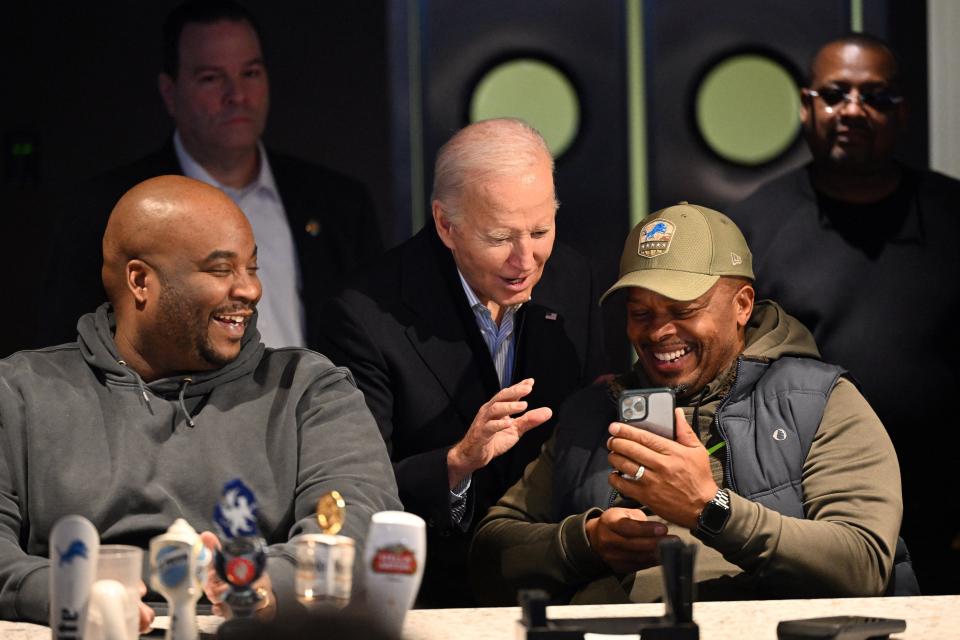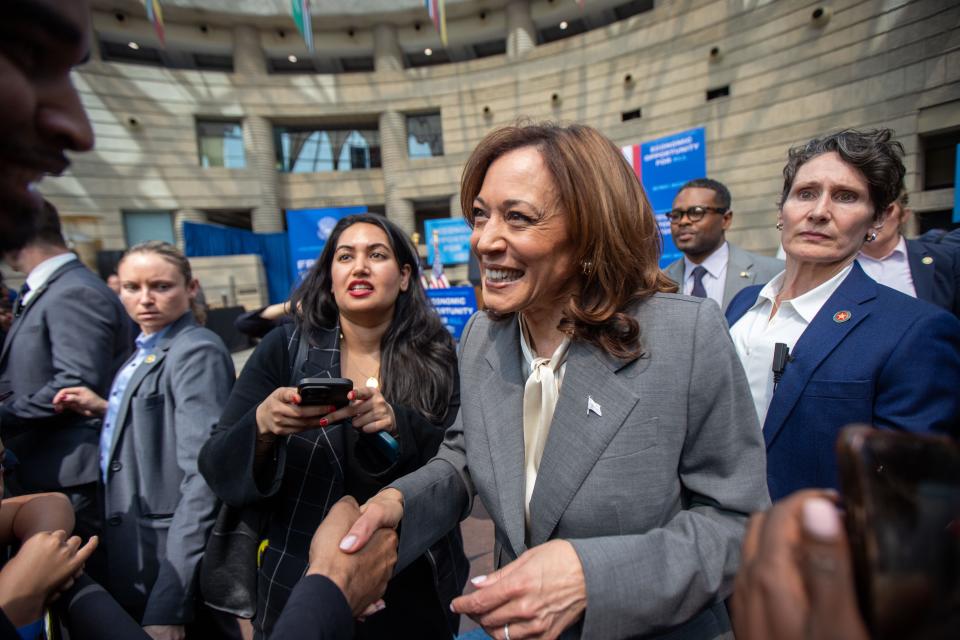Biden heads to Detroit amid campaign push to bolster support among Black voters
President Joe Biden's visit Sunday to speak at the Detroit Branch NAACP's annual Fight for Freedom Fund dinner comes at a time when his reelection campaign faces a fraught question it desperately needs to answer.
It's not whether Black voters will vastly prefer the Democratic president to his Republican challenger in this year's election: that's probably a given, historically speaking. The question is whether they will turn out in large enough numbers in a handful of swing states — Michigan chief among them — to make a difference.
And no one's entirely sure.
Polls in key states have indicated that while Biden is well ahead of former President Donald Trump among Black voters, the level of support is far from what he saw in winning the 2020 election. And, in some cases, the difference is shocking: Exit polls, in which voters were surveyed after casting their ballots in the 2020 election, showed Biden winning 92% of the Black vote in Michigan. But recent polls of Black voters in the state show support for Biden dipping dramatically, to as low as 57% in one poll. A recent New York Times/Siena College poll said Biden's support among Black voters in Michigan topped out at 60%, compared with 30% for Trump in a head-to-head matchup.
"Black people are frustrated that they always come up with nothing," said 38-year-old Jordan Smith, a Black voter in Saginaw who voted for Biden four years ago but isn't certain he'll do so again. "And that is where Blacks are like, 'Screw it, man. You ain't want to do nothing for us, we’re going to the other side just to spite you.' "

He said he is considering voting for Trump this year.
Of course, it's extraordinarily likely that Biden will get the biggest share of the Black vote nationally and in Michigan, a swing state where Black support for Democratic presidential nominees has regularly topped 90%. Those surveys cited talk to far fewer Black voters than white ones, so the potential margins of error are far higher.
But even if those polls are wrong in terms of the support Biden ultimately receives they could presage a lack of enthusiasm among Black voters. And that could be very bad news for the president.
Lessons for Biden campaign in Clinton's 2016 loss?
Given that Biden already appears to be lagging Trump in key swing states including Michigan, any erosion of support could cost him the election.
So, it's no surprise Biden is heading to Detroit for the first time this campaign to be the keynote speaker at the marquee dinner event for the largest branch of the nation's oldest civil rights organization. It clearly underscores the crucial role one of the nation's largest majority-Black cities could play in a battleground state that could decide the election.
"In 2016, everything was dependent on whether Hillary Clinton and Democrats could turn out Black support," said Bernie Porn, pollster for EPIC-MRA of Lansing, which does work for the Free Press and whose surveys have also shown Biden's support lagging among Black people. "They were certainly 10,000 votes short if not more. It could have a dramatic impact."
In 2016, when Clinton lost narrowly to Trump, her support among Black voters in exit polling was 92%. But in Detroit — where the vast majority of the state's Black vote is concentrated — turnout was down from 2012 by some 41,000 ballots, meaning there were far fewer votes for her to get.
Biden campaign prioritizes outreach to Black voters
With the stakes so high, Biden's appearance at the Fight for Freedom Fund dinner isn't the only outreach in Michigan his administration and campaign have carried out with Black voters.
Vice President Kamala Harris, the first Black person or woman to hold the position, stopped in the city this month as part of a nationwide "Economic Opportunity Tour" aimed at Black voters, following a similar event in another swing state, Georgia. Addressing a primarily Black audience at the Charles H. Wright Museum of African American History, Harris highlighted efforts by the Biden administration to tackle racial economic disparities.

Meanwhile, the Biden campaign has opened offices in Benton Harbor, Detroit, Flint, Southfield and other cities with large concentrations of Black voters. Campaign surrogates have traveled across Michigan, visiting metro Detroit churches and holding events on Black maternal health and lead pipe replacement to highlight the administration’s action on those fronts.
And Biden hit the airwaves early, with a $25 million ad campaign last August his campaign says is the largest investment in Black media of any reelection effort. In between songs, Detroit-based radio stations have blasted Biden ads touting the administration’s efforts to narrow the racial wealth gap and elevate Black leaders. A mobile billboard in Detroit bragged about Black unemployment hitting record lows. "Joe & Kamala did that," it read.
Alexis Wiley, Detroit Mayor Mike Duggan’s former chief of staff and founder and CEO of the strategic communications firm Moment Strategies, said Biden's messaging tries to offer an explicit reminder of his administration’s impact on Black voters. "People still want to know what comes next," she said.
Trump, too, has made campaign investments, including his own radio ads appealing to Black voters. The Trump campaign did not respond to a request for comment on its strategy for reaching out to Black voters.

But Trump may not need to win over Black voters to win. He may only need them to refrain from voting. On that front, Biden's Michigan campaign senior adviser Eddie McDonald pointed to a robust operation to turn out the vote.
Wiley suspects the challenge Democrats face isn't a surge in support for Trump among Black voters. "It's that they chose not to vote at all," she said.
"It is clear what’s happening around (the Israel-Hamas conflict) Gaza and also inflation are impacting the president's support and enthusiasm with younger Black voters," said Jamal Simmons, a political adviser and commentator who grew up in Detroit and served as Harris' communication director. "But that's always a worry in Democratic circles. ... It's incumbent on Democrats to reach out to these voters and make sure they know what is happening, that they know they need to plan for and show up to vote."
How did Biden fare in Michigan's majority-Black cities in 2020?
In 2020, Biden won 94% of the vote in Detroit, by far the city with the most Black voters in the state. That was slightly smaller, percentage-wise than Clinton's 95% in the city. Across the state, that trend — with Biden doing slightly worse than Clinton did, percentage-wise — held in most of Michigan's majority-Black cities.
"We're going to do everything we can to never ever repeat that kind of result," McDonald said.
In Benton Harbor, Flint, Southfield and others, Clinton did better percentage-wise than Biden, and Trump, as he did in Detroit, improved slightly on his 2016 performance, according to a Free Press analysis of their head-to-head vote in precinct-level data from the MIT Election + Science Lab. Biden outperformed Clinton in only a few majority-Black cities: Eastpointe, Harper Woods and Lathrup Village.
That trend played out in Michigan's biggest county to a degree as well. In Wayne County — with Detroit as its anchor and home to roughly half of Michigan's Black population — Biden saw a 2-percentage-point gain on Clinton's vote share. But compared with his showing in many other places in Michigan, that was miniscule. In Kent County, for instance, the Democratic margin went from 45% in 2016 to 52% in 2020. In Oakland County, it went from 51% to 56%.
If margins in those other counties aren't as strong, a lagging Black vote could cost Biden the election, even if he carries reliable Democratic strongholds. Trump won Michigan with 10,704 votes in 2016, or about two-tenths of a percentage point, and pundits, in part, blamed Clinton's loss on low voter turnout in Detroit.

This year, there are also concerns that Biden has lost some support, especially among Black men. Detroit political consultant Jamaine Dickens recently told the Free Press there are those men "in the barbershop society," who seem to be attracted to Trump's "brand of politics."
Bakari Sellers, a former South Carolina state representative, political commentator and author, said, "One of the things we're seeing is a great deal of fatigue with Black men in particular," despite the fact that, other than Black women, no demographic gives more of its support for Democrats.
"It's been this decadeslong ignoring from the Democratic Party," said Sellers, whose recent book, "The Moment: Thoughts on the Race Reckoning that Wasn't and How We All Can Move Forward Now," discusses inequities in health care, education and policing that are still rampant four years after the protests that followed the death of George Floyd while being detained by Minneapolis police. "Biden and the campaign have to do something to speak to those men holistically."
He said Sunday's speech offers Biden a chance to articulate a vision for how Black men will not merely survive but thrive. "There's nothing I think Joe Biden can't do," Sellers said. "The question is whether he's willing to throw out the stale playbook of white consultants from yesteryear. ... My admonition would be for him to refrain from getting up there for 25 minutes and talking (only) about criminal justice reform."
First Michigan stop of the year deepens Detroit voter's support
Biden's first campaign stop in Michigan this year came as a surprise to Thurston Rogers, 80, of Detroit, who was out grabbing lunch at one of his favorite spots when the president showed up in February.
Rogers wore a hat identifying himself as a veteran, and when he had a chance to speak with Biden at They Say Restaurant in Harper Woods, Rogers told the president about his exposure to Agent Orange during his military service in Vietnam. Rogers said someone from Biden's office took down his contact information and followed up with a phone call the next day to help him seek disability compensation through the U.S. Department of Veterans Affairs. He said he doesn't know whether he'll be turned down, but it made him appreciate Biden.
"I mean that makes me … love him that much more," Rogers said. "I was just another person in the audience. He didn't have to do that. But he did."

Rogers said he moved to Detroit in 1965 and landed a job on a Ford assembly line. When he retired, he said he had worked for the automaker for 40 years and ended his career as a production general foreman.
Rogers said he hasn't missed an opportunity to vote. It's a right his parents didn't have full access to, he said, noting that they had to pay a poll tax in Arkansas. Rogers said he voted for Biden in 2020 and plans to do so again this year.
Trump's efforts to tie inflation to Biden and attack the president's push for electric vehicles don't resonate with Rogers who said the price of gas, groceries and rent would have gone up under any president and described the electric vehicle transition as inevitable. "It's absolutely coming, so why fight it?" he said.
The prospect of another Trump presidency scares him, and he sees the former president as an authoritarian figure who reminds him of Russia's Vladimir Putin.
"I don't want to live under a dictatorship," he said, echoing Biden's characterization that the future of American democracy is on the line this fall.
Saginaw voter weighs whether to back Biden or Trump
The comparison to Putin is a refrain Smith, the Saginaw voter, said he hears from some of the older Black men in his life.
While Smith said he believes Trump incited an insurrection on Jan. 6, 2021 when his followers stormed the U.S. Capitol to try to keep him in office, that won't necessarily sway his vote. "It should," he said. "But … I think what happens is we often overlook things to get what we want out of our vote."

Earlier this year, Smith had a chance to see Biden during a low-key campaign visit the president made to Saginaw. Several weeks later he attended his first Trump rally, which he described as a way to research the candidate.
"No one was rude, racist. Everybody was friendly," he said. Smith said he didn't stay the whole time, as Trump's speech grew repetitive. It made him ask himself whether he could endure Trump’s rhetoric for another four years.
But Smith said he's not with Biden on two issues: illegal immigration and the Israel-Hamas war. He sees a need for policies to manage an influx of immigrants entering the country illegally. On the war, Smith said, "I'm for Palestine, I have Palestinian friends." Smith said he doesn't know how Trump would approach the war, but he said he knows how Biden’s handling the conflict. He'd like to see Biden demand a permanent cease-fire.
Smith also questioned whether Biden had made changes to improve life for Black Americans. He called Biden’s selection of Harris as the nation's first Black vice president historic and worth celebrating.
"But was that enough? And then how did that really impact my life?" he asked.
Contact Clara Hendrickson: [email protected] or 313-296-5743. Follow her on X, previously called Twitter, @clarajanehen.
Contact Todd Spangler: [email protected]. Follow him on Twitter@tsspangler.
Looking for more on Michigan’s elections this year? Check out our voter guide, subscribe to our elections newsletter and always feel free to share your thoughts in a letter to the editor.
This article originally appeared on Detroit Free Press: Black voters in Michigan could sway 2024 election
